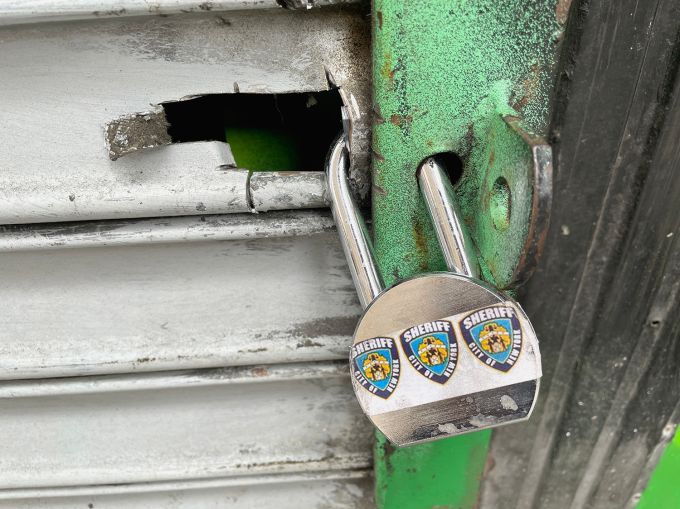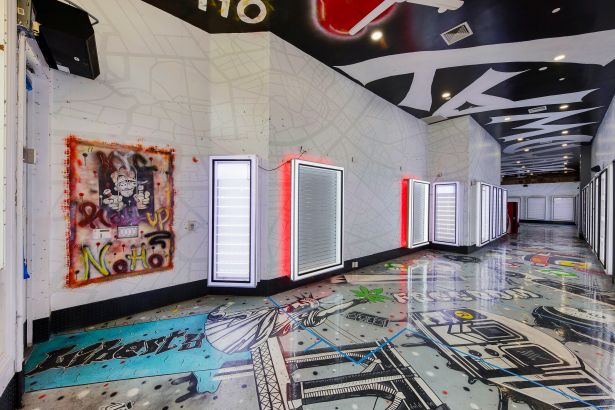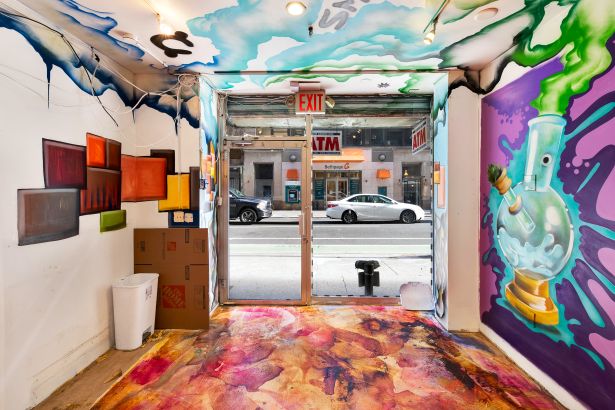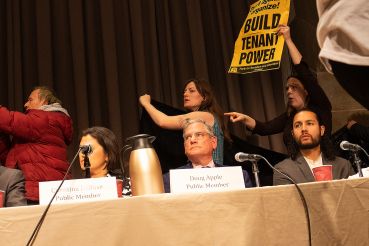NYC Retail Market Wakes Up in a Daze After Smoke Shop Day of Reckoning
As the city starts padlocking illegal smoke shops, the retail market could see thousands of available storefronts
By Abigail Nehring June 10, 2024 2:54 pm
reprints
Roll Up Nation disappeared from NoHo without a trace last month, leaving nothing but an expensive sound system, a few stray rolling papers, and a 1,927-square-foot epoxy mural painted underfoot across the ground-floor retail space the unlicensed dispensary had been renting at 738 Broadway.
The storefront directly above the Eighth Street/NYU stop on the R train is available to rent, and its landlord is asking $125 per square foot. That’s 20 percent less than what Roll Up paid, according to Meridian, which has the listing.
“This was not just your standard smoke shop,” said Jordan Langer, who’s handling the listing for Meridian. “They wanted to make an immersive experience. They would set up a DJ booth and have parties.”
And all that cash made Roll Up undeterred when state regulators first hit the shop with civil penalties last year, according to Langer.
“It was such a lucrative business at the time, to the point it didn’t even matter,” Langer said.
But that’s all changing now.
Thanks to new regulations lawmakers passed in Albany this spring, the New York City Sheriff’s Office and New York City Police Department now have the ability to padlock unlicensed cannabis dispensaries. In the first four weeks of the law’s implementation, officers sealed off 311 stores, according to Mayor Eric Adams’s office.
Many more cannabis retailers are taking the hint and packing their bags voluntarily after operating in a legal twilight zone for about two years. Their landlords, left holding the keys to about 3,000 vacant storefronts across the city, will probably never get such a generous injection of cash again in any real estate cycle.
“It’s a bit of a wake-up call,” Langer said. “I think landlords are going to understand that we don’t need to achieve the highest rent right now. We just want a rock solid tenant who’s going to provide long-term stability.”
Roll Up paid $50,000 a month in rent, or $156 per square foot annually, for the 3,850-square-foot ground floor and lower-level retail unit at the base of the five-story Broadway McKenna Building (where Paris Hilton dropped $5 million for a condo in 2014).

The income from the smoke shop’s triple-net lease was well above NoHo’s average retail asking rent of $101.46 per square foot, according to PropertyShark. In fact, the landlord — a New Jersey limited liability company tied to Baruch Adika — was earning enough to make back its $4.5 million investment in the property after seven years.
Now, Langer is hoping the space will fetch a more modest $40,000 a month in rent. The unit was previously home to New York footwear retailer David Z. and was later leased to electric scooter designer Inokim after the Chetrit Group redeveloped the building into condos that listed for $6 million in 2014.
Despite the financial hit for some landlords, the padlocking of illegal dispensaries is great business for Meridian. The brokerage already received dozens of calls over the past week from landlords of newly vacant smoke shops, according to James Famularo, head of retail leasing for Meridian.
“It was pretty amazing how the city built such a portfolio of stores in such a short amount of time,” Famularo said. “We see this as a trend that has come to an end. Remember the fro-yo trend?”
Not so long ago, you could buy frozen yogurt on almost every block in NoHo. But Red Mango, Pinkberry and 16 handles have retreated from New York City, and that’s just fine with Famularo.
“They were in a rush to get open,” Famularo said. “And then when it fizzled out, we marketed the space and leased out every single one of them.”
But the sheer size of the city’s illicit cannabis trade makes that a dubious comparison, and the dearth of data on how these tax-free operators have impacted the retail market is generating a surfeit of anxiety for some.
“When cannabis was legalized, there was a tremendous void in the retail landscape following the onset of COVID-19,” said Adam Lindenbaum, an attorney at Rosenberg & Estis. “A lot of our clients were eager to rent up their vacant space, eager to receive these very fair, or sometimes over-market offers, with the understanding that things wouldn’t be done completely above board.”
Retail’s turnaround after the pandemic was remarkable, with rolling aggregate four-quarter retail leasing velocity in Manhattan’s prime retail corridors climbing back to 2.6 million square feet last quarter, according to CBRE (CBRE). It fell to a historic low of 1.55 million square feet in the first quarter of 2021, the year cannabis was legalized in New York.
But the quickly changing legal landscape has simultaneously spurred a new class of clients at Lindenbaum’s firm.
That doesn’t include the owners of properties on prime retail corridors — including Fifth Avenue in Midtown where asking rents average $2,515 per square foot — as they tend to be institutional investors and proved less willing to gamble with the law, said Newmark (NMRK)’s Ariel Schuster.
“I think it’s clear to our clients,” Schuster said. “We saw a lot of spaces being absorbed by these tenants, and that’s really not a great long-term plan. Now you’re seeing them closing down, which is great for the city.”
Instead, smoke shops popped up fastest on blocks littered with papered storefronts where the asking rent is much lower and owners tend to be shielded behind anonymous LLCs.
A prime example is the 1,300-square-foot storefront at 110 West 26th Street, another former smoke shop Meridian is now marketing to prospective new tenants. Asking rent is $78 per square foot, according to Meridian’s Bobby Ortense.
The former tenant, Chelsea Exotics Convenience, paid $97 per square foot to lease the space, which has also been used for an art studio and a nail salon.
“These smoke shops were literally printing money,” Ortense said. “They were selling drugs without a tax, and their margins were insane.”

The role landlords played in the halcyon days of the illegal smoke shop — and the green premium they cashed in on — did not escape the notice of state regulators or local district attorneys.
Roll Up Nation was among the first shops the state Office of Cannabis Management targeted in June 2023, when it began to use its newly granted authority to inspect the stores and issue civil penalties. While the store’s owner, Omar Eid, battled the fines in a state administrative trial, the city sheriff’s office began to take aim at landlords, putting several dozen retail owners on alert about penalties of up to $1,000 a day for allowing smoke shops to continue operating.
It’s unclear if Adika, the owner of the retail unit at 738 Broadway who did not immediately respond to a request for comment, got hit with fines. Roll Up Nation’s lawyer, Paula Collins, represented the business in state administrative hearings and did not immediately respond to a request for comment.
A spokesperson for the sheriff did not respond to a request for comment. The city’s Department of Finance has asked for repeated extensions to respond to a records request Commercial Observer made in November for details on the landlord enforcement efforts.
Landlords’ fate may continue to play out in administrative court for some time, with the city threatening to go as far as foreclosing on some properties, according to Lindenbaum.
“If the landlord is truly not in compliance, and they’re not responding to the court action, and not appearing, not doing anything to get rid of the tenant, you could, in a worst-case scenario, wind up forfeiting the property to the government,” Lindenbaum said.
In the meantime, for operators like Roll Up, the writing was on the wall by the time Adams’s padlock operation got underway.
Langer said he doesn’t know where the store’s owner is now, or how things wrapped up between the landlord and former tenant. But a wave of nostalgia is already beginning to hit.
Langer struck a mournful note as he ambled past Lady Liberty painted near the front of the barren sales floor and crossed over a hot dog smoking a spliff, pausing where the unknown artist had scrawled “best location ever” in giant, drippy bubble letters.
“It’s almost a piece of history now,” Langer said. “You almost want them to preserve it.”
Abigail Nehring can be reached at anehring@commercialobserver.com.


